| Srl | Item |
| 1 |
ID:
110775
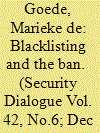

|
|
|
|
|
| Publication |
2011.
|
| Summary/Abstract |
This article examines the practice of targeted sanctions as they are deployed against individuals and groups suspected of financing and facilitating terrorism in Europe. Substantial academic attention and critique has surrounded targeted sanctions and blacklists, as these practices challenge existing logics of evidence, criminal culpability and proportionality. This article seeks to move the analysis of blacklisting beyond the breach of individual rights and toward an understanding of the wider political implications. It draws upon the work of Giorgio Agamben to offer a reading of blacklisting in terms of its symbolic function of banishment and exclusion, which simultaneously redraws the boundaries around normal, valued, ways of life. The article teases out the exceptional and pre-emptive nature of blacklisting as a security measure. It analyses in some detail the Kadi case before the European Court of Justice, and argues that blacklisting and its current contestations work to inscribe the principles of pre-emption into the international juridical order.
|
|
|
|
|
|
|
|
|
|
|
|
|
|
|
|
| 2 |
ID:
145973
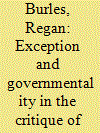

|
|
|
|
|
| Summary/Abstract |
This article investigates the relation between exception and governmentality in the critique of sovereignty. It argues that the problem of sovereignty is not only expressed between the accounts of sovereignty that exception and governmentality articulate, but also within each of those accounts. Taking Michel Foucault and Carl Schmitt as the paradigmatic theorists of governmentality and exception, respectively, this article engages in close readings of the texts in which these concepts are most thoroughly elaborated: Security, Territory, Population and Political Theology. These readings demonstrate that the spatiotemporal expression of the problem of sovereignty within exception and governmentality renders these concepts indistinguishable from one another in terms of their relation to the boundaries of political order. Schmitt and Foucault’s accounts of sovereignty should thus not be read as opposites, but as expressions of the limits of modern political authority. Efforts to develop a critique of sovereignty through typologies of exception or governmentality are bound to reinstantiate the spatiotemporal limits expressed by the principle of state sovereignty.
|
|
|
|
|
|
|
|
|
|
|
|
|
|
|
|
| 3 |
ID:
120405
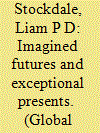

|
|
|
|
|
| Publication |
2013.
|
| Summary/Abstract |
This article critically considers what is at stake with the emergence of a 'pre-emptive' politics of security based upon governing the future through anticipatory interventions in the present. It begins by developing a detailed account of how the idea of pre-emption has come to inform the global governance of (in)security in the post-9/11 era. It then turns to a discussion of the logic of pre-emptive security itself. Here it is argued that its focus upon the future implies a prioritization of the imagination in its decisional logic, which has the effect of enhancing the degree of discretionary subjectivity granted to state authorities under a pre-emptive approach. The article then expands upon this claim by considering how it suggests an important conceptual link between a politics of pre-emption and political exceptionalism. It then concludes that the very notion of pre-emptive security can be seen as conceptually incoherent, since this link serves to compromise its capacity to produce a condition congruent with the understanding of 'security' presupposed by its own normative framework. Accordingly, the practical viability and political legitimacy of pre-emption as a rationality for (in)security governance can be seriously called into question.
|
|
|
|
|
|
|
|
|
|
|
|
|
|
|
|
| 4 |
ID:
071963
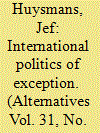

|
|
|
|
|
| Publication |
2006.
|
| Summary/Abstract |
Both political leaders and academics often claim exceptional times. But what does it mean to speak of exceptional politics in international relations? In one sense exceptionality is a descriptive category referring to a radical change in the systemic conditions of international politics. In this article a different notion of exception is examined. It refers to a particular method of conceptualizing the nature of international political order. The exception defines political order by means of constitutional-legal reasoning in which different understandings of the nature and status of international law and its political transgressions describe competing visions of international political order. The focal point of this international politics of exception is not the traditional distinction between liberal and realist views of international politics but the constitutionalist triad of normativism, decisionism, and institutionalism.
|
|
|
|
|
|
|
|
|
|
|
|
|
|
|
|
| 5 |
ID:
183900
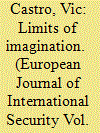

|
|
|
|
|
| Summary/Abstract |
Securitisation theory has too often been associated with the liberal state of exception and its problematic baggage. The Copenhagen School's early claims to deconstruct (not reproduce) the national security logic seem overlooked. Using the fantasy video game World of Warcraft as a large-scale thought experiment, this article asks how a distinct security mode is still possible when the normalisation of armed violence exceeds even what Carl Schmitt's political theory can provide for. Following a careful reading of Ole Wæver's formulation of the ‘existential threat’, securitisation asserts that without a certain referent object, the world becomes meaningless. As a tool for reshaping the limits of imagination, securitisation enacts political communities in World of Warcraft by turning upside down common wisdom about normalcy and security. While normal politics are violently conflictual, securitisation fills in the role of international norms and organisation, fostering supranational cooperation and erasing sovereign disputes. Securitisation thus far exceeds its contingent incarnation in the modern concept of security – a conclusion that has consequences for the normative debate on securitisation and for non-Western interpretations of the theory.
|
|
|
|
|
|
|
|
|
|
|
|
|
|
|
|
| 6 |
ID:
159785


|
|
|
|
|
| Summary/Abstract |
What happens to sovereign power when petty sovereigns refuse to exploit discretionary power to suspend the rule of law, the very power that is delegated to them and makes them who they are? How might such a refusal contribute to a better understanding of the relationship between resistance and sovereign power? This article revisits Judith Butler’s notion of petty sovereigns to explore the possibility that petty sovereigns establish a distinctive relationship with law. This article draws on a case involving one nameless petty sovereign and his published writings. He writes novels to expose how law is used by some officials to realize a particular policy goal with regards to nuclear energy. His novels blur the line between fiction and non-fiction: it contains classified information only available to bureaucrats, discusses actual energy policies and related laws, and introduces fictional characters who resemble non-fictional characters. I argue that this example suggests that petty sovereigns are not necessarily tied to the node between governmentality and sovereignty. Shifting between the worlds of fiction and non-fiction, petty sovereigns slip away from sovereign power, which controls the subject-making process, and quietly resist sovereign politics through the contingency of subjectivity.
|
|
|
|
|
|
|
|
|
|
|
|
|
|
|
|
| 7 |
ID:
134146
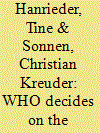

|
|
|
|
|
| Publication |
2014.
|
| Summary/Abstract |
This article analyses the emergency governance of international organizations by combining securitization theory with legal theory on the state of exception. Our main argument is that where issues are securitized as global threats, exceptionalism can emerge at the level of supranational bodies, endowing them with the decisionist authority to define emergencies and guide political responses. We theorize the 'emergency trap', which is triggered when the emergency powers of international organizations reduce the obstacles to, and increase the incentives for, the securitization of further issues. Based on the idea that the emergency trap functions as an institutional driver of securitization, we also highlight the importance of the constitutional containment of emergency competencies as an alternative to discursive desecuritization strategies. We illustrate this security-emergency dynamic in a case study of the recent empowerment of the World Health Organization (WHO) in the governance of global health emergencies. The article shows how WHO's exceptional response to the 2003 severe acute respiratory syndrome (SARS) crisis paved the way for an institutionalization of emergency powers within the organization and contributed to securitizing the 2009 swine influenza outbreak as a global pandemic. However, WHO's crisis governance has also triggered internal and external processes of constitutional contention.
|
|
|
|
|
|
|
|
|
|
|
|
|
|
|
|